Courtesy of Xu Bo
While coronavirus serves as an ever-present threat around the world, China's punk musicians are weathering the storm the best they can.
Long before the ongoing coronavirus (COVID-19) outbreak in Wuhan, China, there was something else that went viral from within the city: punk music. Foreign music journalists have often referred to Wuhan (the capital city of Hubei province) as the “the Chicago of China”, a city historically steeped in dissidence and revolution.
Today, the streets have emptied, over 50,000 people have been infected and 2,800 people have died in Hubei province alone from COVID-19. Public anger is growing over why the Chinese government didn’t take action earlier in Wuhan, and why they weren’t more forthcoming about the official numbers of those infected.
Two popular citizen journalists who dared to speak out about the outbreak have recently been detained or gone missing.
Our correspondent Hugh Bohane interviewed several Wuhan musicians and one China-based music promoter working on the frontlines of the country’s indie music scene to see how they are all coping during this lockdown crisis, and asked them about the current situation for musicians in Wuhan and wider China.
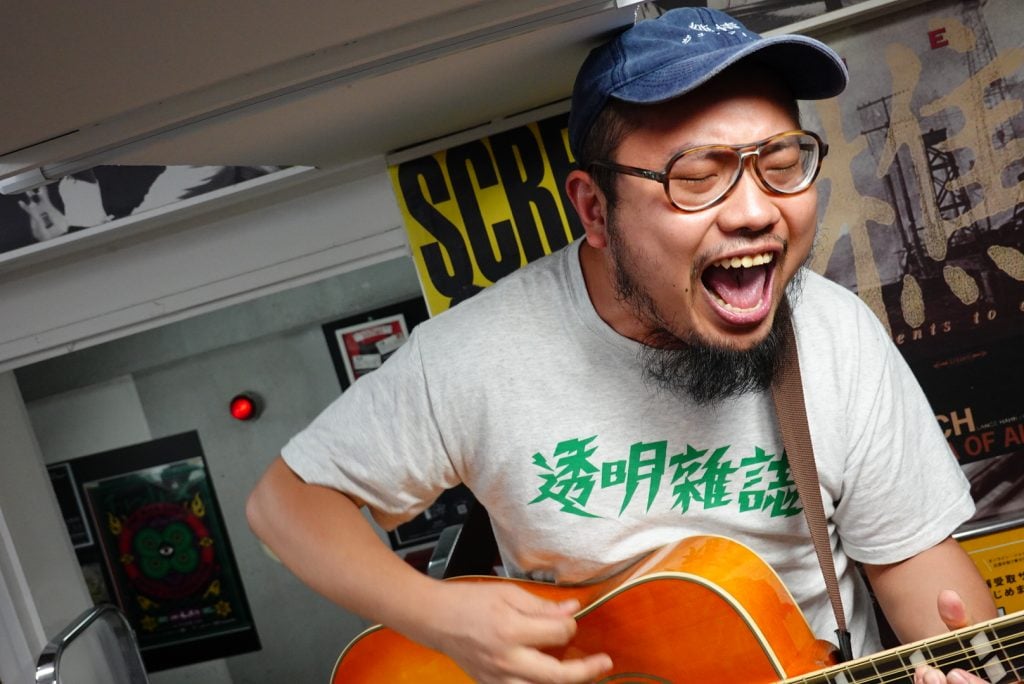
Xu Bo is the guitarist and vocalist for Wuhan math-rock band Chinese Football. Photo courtesy of Xu Bo.
Xu Bo is the guitarist and vocalist for Wuhan math-rock band Chinese Football.
Rolling Stone chatted with Bo over WeChat from his hometown of Wuhan, where he has been staying at home all day with his parents, checking the news, and playing his guitar.
“My band members are all staying at home so we can’t practice at this moment. And our upcoming shows are all delayed,” Bo says. “However, I have been doing some live music online for fans sometimes. I post a video everyday on my personal social network, on Weibo. I play those songs at home with acoustic guitars, Casiotone keyboard, and sometimes with a looper and other instruments.”
Love Music?
Get your daily dose of everything happening in Australian/New Zealand music and globally.
Rolling Stone asked Bo whether he was worried about rising sinophobic attitudes from outside China in light of the new virus.
“I think it’s maybe an issue, but it isn’t a big problem. China was already the enemy of the western world before coronavirus, wasn’t it?” asks Bo. “But I think people with a heart who can think independently would not think so, because after all, we are all the same.”
Wuhan is a city of roughly nine million people and has a history of being inclusive towards creative types, which is largely due to the fact that there are many university students living there and young people’s general openness to new ideas. It was famously crowned as “Punk City” because of its many prominent punk bands back in the ‘90s.
COVID-19 has dealt a heavy blow to the entire music scene in Wuhan. Live venues will not be allowed to hold shows during the coming month and full-time musicians will have to find other ways to source an income.
On the upside, artists like Bo now have a lot of time to write songs and create music from their homes. Moreover, China’s music scene has seen continual growth in recent years, and the size of the audiences is increasing. Bands like Chinese Football, with a strong following, have more opportunities to perform at esteemed livehouses and music festivals.
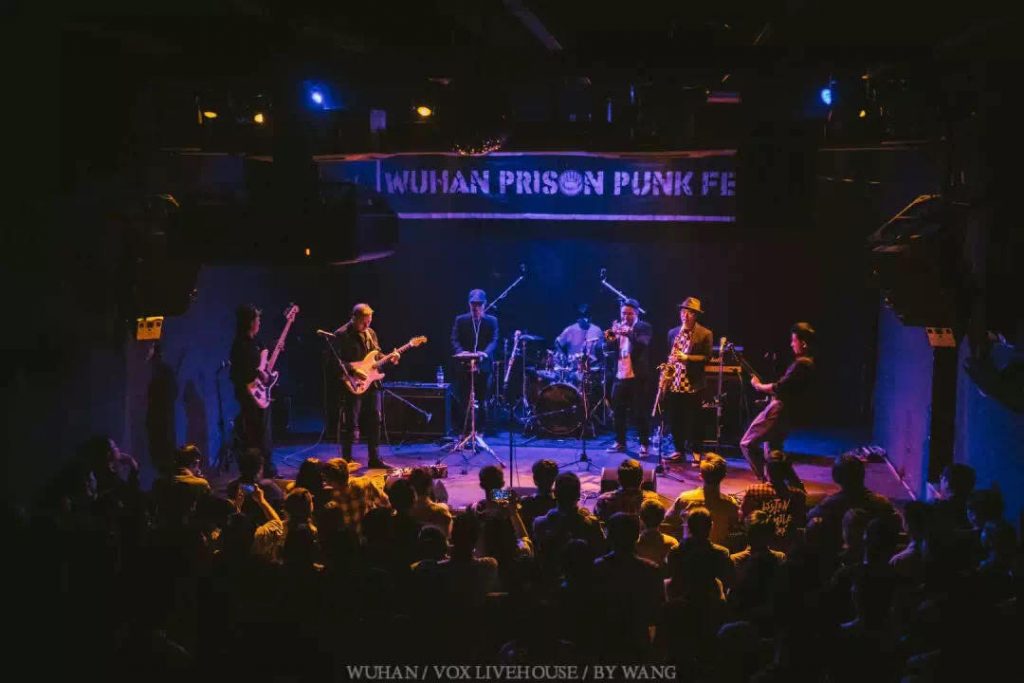
Ska/reggae band Sky King Jack performing live. Photo: Supplied.
Lucas is a barber and also the guitarist for ska/reggae band Sky King Jack.
He is also on lockdown in Wuhan, the epicentre of where the virus started and where the situation is still grave. His band has temporarily stopped rehearsing and recording while delaying their projects until later in the year. In Wuhan, the city and streets have been emptied, and everyday goods are being purchased and distributed by the neighbourhood committees.
“The best response we can show is to stay at home and not go out, keep a good attitude, and ensure our physical health.”
“The best response we can show is to stay at home and not go out, keep a good attitude, and ensure our physical health,” says Lucas. “Wuhan has a very positive scene for rock and indie music. There are many universities and the new generations keep coming and going.
“Young people are highly receptive to different cultures. Wuhan breeds many musicians devoted to promoting independent music, many excellent bands and musicians; not just for punk music.”
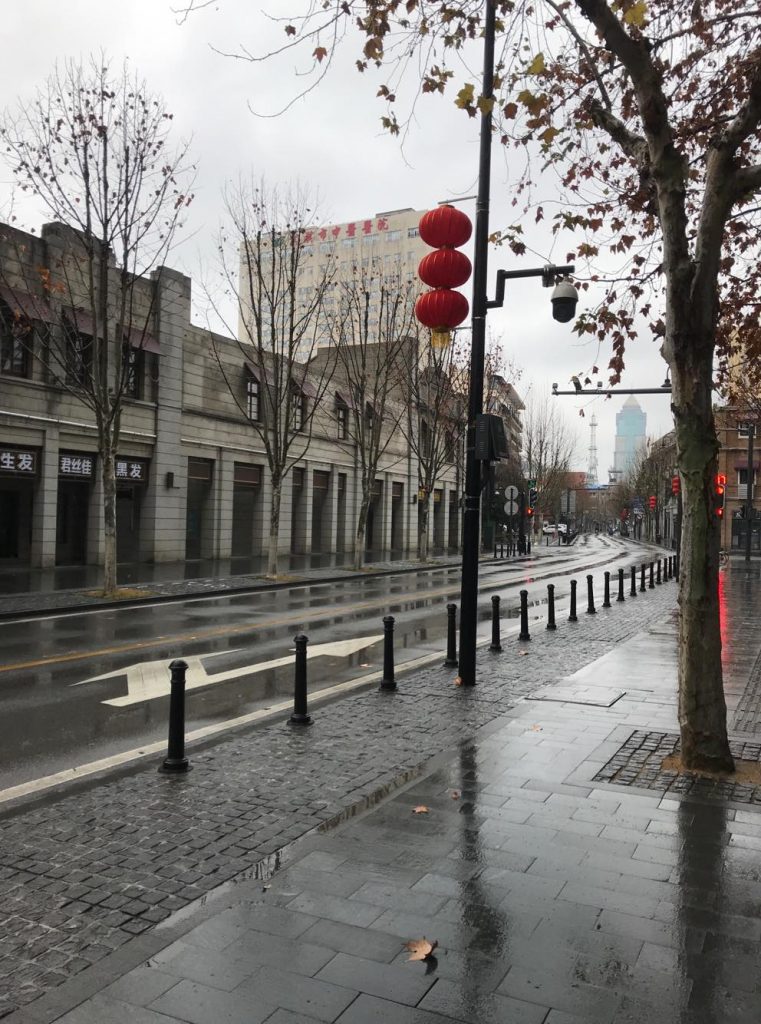
The streets are empty in Wuhan. Photo: Supplied.
Lucas noted that, importantly, Wuhan was the place where the 1911 Wuchang Uprising (a revolt that ended China’s monarchy) started and that the “punk” resistance gene has “flowed deep in the people’s blood” there.
Before 2010, the underground music scene in Wuhan was famous for punk music and nurtured a number of punk bands. However, after 2008, large amounts of music, lyrics, books, websites and so called “sensitive content” became banned in China. Since then, there is a growing sentiment amongst certain members of the community that China has become overly consumeristic, capitalistic, and that government control has become a lot tighter.

Dance-rock outfit Da Bang. Photo courtesy of Pupi.
Pupi is an artist, and the lead singer for dance-rock band Da Bang. She is now in southern Sweden, and since she is not in the same city as her other band members from Da Bang, she has been trying to create some songs online via her computer. The band is hoping to release a new album this year. Pupi had planned to celebrate Chinese New Year with her grandmother and some of her other family members from Wuhan, but she had to abandon her trip because the virus had started to quickly spread.
“These days I feel like a lot of musicians in China are going in two very different directions,” Pupi says of the current state of the music industry in China. “One way is to become a super underground band where you may get banned any day and your music will be deleted from the internet in China. Another way is to feature on a state-run TV talent show and become a super rich and famous ‘influencer’.”
Pupi told Rolling Stone that she has turned down a couple of invitations to go on talent shows in the past, despite some people around her telling her she was unwise not to do so.
“While there is still space for independent or underground music in China, mainstream pop music culture still dominates and it feels like in recent years there is less space for anything else,” said Pupi.
Chinese rock music started to develop around the ’80s, and Beijing was where the earliest bands formed. Wuhan and other provincial capitals had similar inception times. Wuhan and Beijing were the first cities in China to have punk and rock bands.
Much like the European and American music markets, Chinese popular music began to develop under the influence of European and American music, in addition to Hong Kong and Taiwanese music.
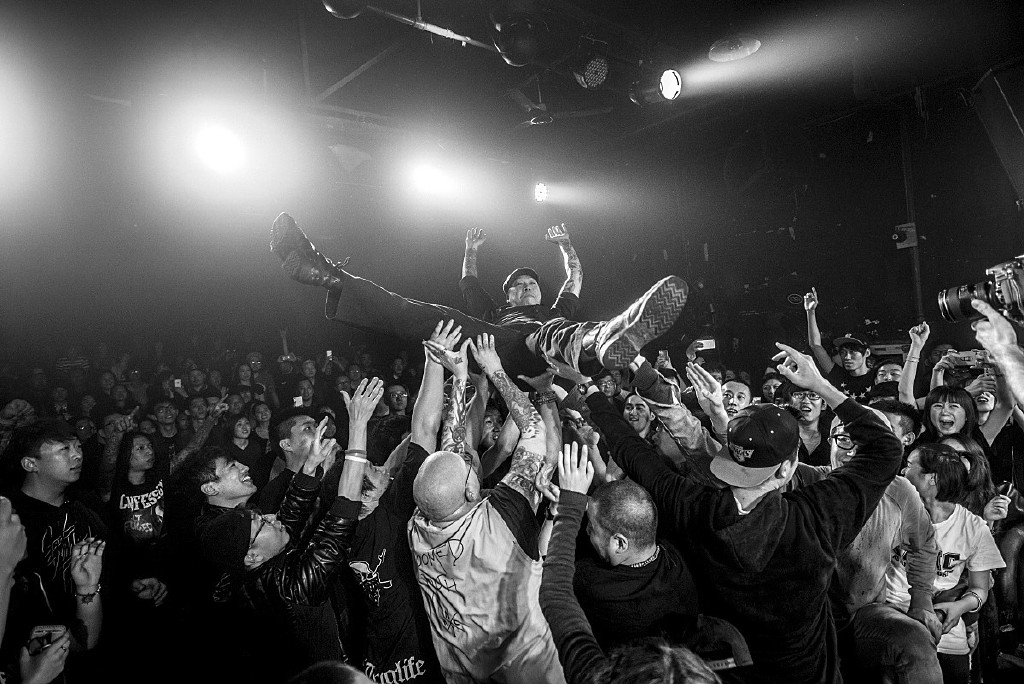
Wu Wei crowd surfing as the frontman of SMZB. Photo courtesy of Wu Wei.
Wu Wei is a manager for the dive bar Wuhan Prison and the frontman for the Chinese Celtic punk band SMZB. He has penned songs about getting naked and running from the cops. Wei is considered to be one of China’s first punks, and someone who in the past even had his phone tapped by the Chinese government.
Wei travelled to Portugal in mid January, and a few days after arriving he heard about the outbreak in Wuhan. His band SMZB (an acronym for a Chinese phrase, “bread of life”) and his solo albums are currently at the end of the mixing and production phase.
“Music knows no borders, and its geographic boundaries will be diminished.”
He told Rolling Stone over the phone that he is happy to be in a “relatively safe country” and he’s not particularly worried about catching the virus, but holds some concerns for his family and friends back in Wuhan.
In a recent article for Unite Asia, Wei offered his support to the people of both Wuhan and Hong Kong, saying “Stay strong, Wuhan”, and “We hope all our Hong Kong friends and citizens will continue to fight for yourselves and future generations. You all deserve a better future.”
“Soon more Chinese bands will enter the international market, and they will be seen and heard and understood by more people of different nationalities,” Wei tells Rolling Stone. “Music knows no borders, and its geographic boundaries will be diminished.”
Archie Hamilton is the head of music promotions agency, Split Works. Based in Beijing and Shanghai, he has assisted major international acts touring within China such as: Kurt Vile, Grimes, Sonic Youth and many more, while also setting up major music festivals such as Concrete and Grass in Shanghai.
Hamilton is currently in a holding pattern with his family in Australia. He told Rolling Stone that most major music events have been cancelled for the first half of the year, not just in Wuhan, but China as a whole, and he thinks that this will also bleed into the rest of Asia.
Anything of any importance scheduled for the first half of the year has since been cancelled or postponed to the second half of the year ,and there is a lot of other events that probably will never happen as a result. Consequently, it is going to be tough times for companies like Hamilton’s, for live venues, music festivals, and anyone working in Asia’s music industry.
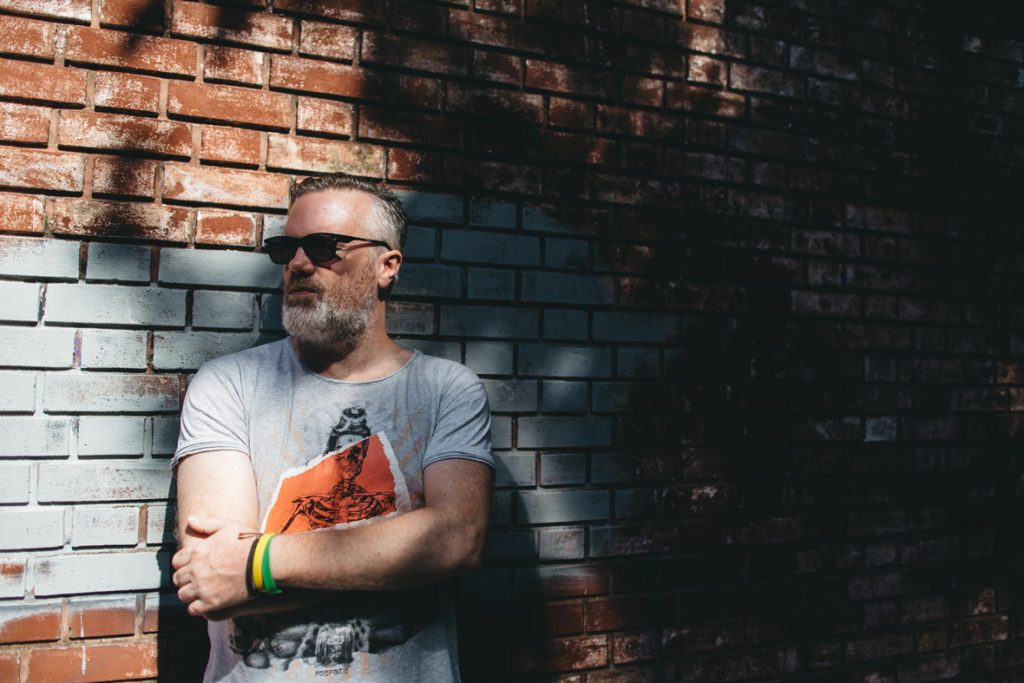
Head of music promotions agency Split Works, Archie Hamilton. Photo: Supplied.
“It’s going to be difficult for the next six months, but I think that people who stay in the game will eventually win because the China market is still on a positive growth curve, even though it’s going to be tough to survive,” said Hamilton.
“I first travelled to Wuhan in 2008, when we took an overseas artist called Dandi Wind there,” Hamilton says of his experiences taking bands to Wuhan. “Wuhan was phenomenal for years. VOX Livehouse was a mecca in China for rock music, as a steel city type-of-place, very industrial, very blue collar, the music was raw, rough and exciting and lots of the best bands in China, in my opinion, come from that city. Chinese Football and SMZB [are] raw and punky bands and the attitude there [in Wuhan] is to cut loose and party.”
A short 2018 documentary on the Wuhan punk scene can be viewed on YouTube.
Hugh Bohane is a freelance journalist who covers music and politics in Asia.



































